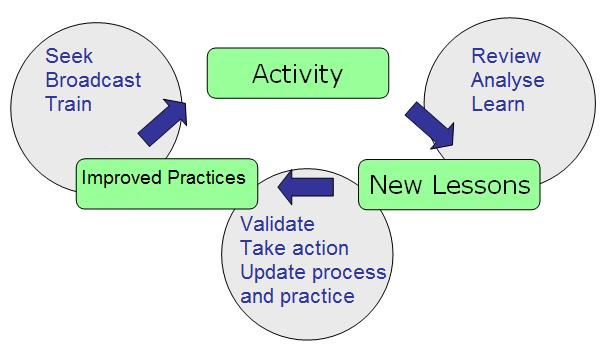
The lessons learned process is a key part of KM - where new knowledge and new learnings are identified through activity and review, and incorporated into future work practices. It seems a simple concept, yet many of our clients are unhappy with their Lessons Learned process. Maybe they have a lessons database, but no lessons are coming in. Or they have a lessons database, and it's full of rubbish. Or they have a lessons database full of good quality lessons, and yet nothing ever seems to change, and the same 'mistakes' are made over and over in the business. So why does Lessons Learned seem so difficult to get right?
The answer, it seems, is linked to another of our observations - organisations in which KM "sticks" and consistently delivers business value tend to be characterised by the ability to execute with discipline and rigour.
We are beginning to come to the view that a lesson is not an end in itself. A lesson is a temporary step along the way to a process, or to a process improvement. Therefore a lessons database needs to be replaced by a Lessons Management System - something that forms a temporary home in a workflow, rather than a permanent repository.
Think about a lesson coming out of a Retrospect. What have you learned? Generally you have either learned how to do something for the first time, or you have learned a better way to do something (or of course, if the project was a disaster, you have learned a new way NOT to do something). So the lesson points to one of two actions
This second point - process improvement - is implicit in the third question of the After Action Review - "why was there a difference between what we expected, and what actually happened". The team followed the process, there was a difference from expectations, and therefore changes need to be made to the process. If there are no differences, then the process works perfectly, and we need to make no changes. You can generalise this by concluding that "Learning has to lead to change". If there is no change, there has been no learning. A lessons learned system needs to feed through into process change, as shown in the figure below. If this cycle is going to work, then we need, as part of our Knowledge Management Framework, the following things.
People seeking knowledge now need to look in only two places for knowledge - the corporate guidelines, procedures and best practices, and the pending lessons. There's no need to wade through hundreds of past lessons, because all the good ideas are already incorporated into the guidelines. Excellence in following through to turn lessons into actionable process improvement is therefore a defining characteristic of learning organisations, and in these organisations we seldom if ever hear the claim "Lessons Learned doesn't work".
